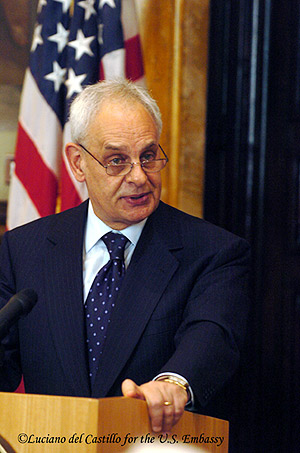15 April 2005
Madam Under Secretary, Mr Ambassador, Mr Secretary General, Mr Chairman of the Fulbright Italian Committee, Ladies and Gentlemen, dear friends,
To begin with I should like to say how honoured I am by the presence at this ceremony of the Under Secretary of State Patricia de Stacy Harrison, whose work and achievements as an entrepreneur, as a politician and as an advocate of many good causes all over the world, also in her former capacity of a leading member of the National Italian American Foundation, are widely recognized, and whom I personally wish to thank for being here.
It is a great honour to receive the Fulbright Gold Medal. My intellectual honeymoon is linked to the Fulbright scholarship. It was thanks to this scholarship that I was able to go to the University of Pittsburgh in 1984 as a visiting fellow. It was thanks to this scholarship that I had the opportunity for crucial meetings with the most distinguished American scholars in my field of study – the philosophy of science. And it was thanks to this scholarship that I was able to embark upon my academic career. Twelve years later, in 1996, I had the chance to win another scholarship. But I made a mistake. I didn’t listen to my wife and I did not apply: I took up politics and eventually I became Speaker of the Senate.
There is another reason why I am grateful to the Fulbright. It allowed me to foster my love of America, which has always been very profound. From a very early age, I was brought up thanks to the contributions that five brothers of my beloved grandmother used to send to my parents. And when I was grown up I felt deep appreciation for a country that offers the greatest opportunities to all, without distinction. It was in 1984 that I fully realized that.
This is what happened. One day that year I received a letter from an eminent American professor inviting me to a conference. I was an unknown young researcher. I knew who he was, but he knew little about me as my publications were in Italian. But he had formed an opinion of me and wanted me to contribute a paper at the international conference he had organized. I plucked up courage and set off. My English was non existent and I remember having difficulty even in asking how to get to that place that our physiology forces us to approach two or three times a day. I felt like an immigrant, precisely, I guess, like Domenico, Raffaello, Beppe, Dino and Pietro, the five legendary brothers of my grandmother. When, during my time in Pittsburgh, I was able to go to California for the first time, only one of them was still alive. It was Thanksgiving. I met my uncle Beppe, we looked at each other, and both burst out crying as happily as I have ever done in my life. ‘Boy’, he said, ‘this is a great country’. He said ‘great’, not ‘big’, or ‘powerful’ or ‘rich’. I will never forget this.
That is why today I feel honoured and grateful. The Medal I receive today embodies one of the great American ideas: cooperation. Senator Fulbright was a far-sighted man, who became one of the most influential and widely heeded representatives of America. I don’t think many know of the significant contribution he made to the creation of the United Nations in 1943 at the House of Representatives, before being elected to the Senate, where he served without interruption from1945 to 1974. The distinguished British historian Arnold Toynbee summed up Fulbright’s programme for the promotion of cultural exchanges as follows: ‘one of the really generous and imaginative things that have been done in the world since World War II, and the most fabulously profitable investment ever authorized by Congress’. Indeed the programme has had enormous knock-on effects, generating the greatest number of educational exchanges ever seen in history, and is still one of the most effective tools of US public diplomacy.
Senator Fulbright could never have imagined what would happen sixty years on. His intention was to publicize the most deeply-rooted values of American society: moral rectitude; tolerance; respect of diversity; attachment to freedom and democracy; the passion for intellectual debate; open-mindedness. Today it seems that many no longer appreciate these values. It seems that Europe is no longer grateful to America. Indeed it seems that Europe is trying to adopt an anti-American identity. This is not only ingratitude and shortness of memory. This is not only an offence to the many thousands of American soldiers buried in European cemeteries. This is a serious historical, cultural and political blunder. To those who say ‘Down with America’, I say ‘Thanks, America’. To those who say ‘There is another America’, I say ‘There is the America you see, in which you live, from which you reap benefits’. We got through difficult times, we face new challenges, we can’t make it without America.
Let me to conclude on another personal note, although of a different kind. I am particularly happy that this ceremony is being held at the American Embassy, under the auspices of a great diplomat who has been one of the best ambassadors from his country in Italy. I wish to express to Mel Sembler and his wife Betty my friendship, my admiration and my gratitude. If the relations between Rome and Washington are so good today, we owe it also to him, to his ability to have accompanied and encouraged such a strong tie that is unequalled in our history.
Mel and Betty, as you depart from Italy, I wish to thank you. But I must warn you. Mind what you say. If you were to invite me to St Petersburg, I have to tell you that I may accept.
Thank you all for being present here; thank you for your kind remarks and for this prestigious award, which means much to me.
